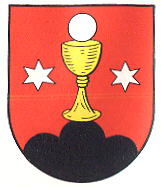Ottersweier: Difference between revisions
Knorrepoes (talk | contribs) No edit summary |
Knorrepoes (talk | contribs) m (Text replacement - "{{de1}}" to "{{de}}") |
||
| Line 41: | Line 41: | ||
[[Civic Heraldry Literature - Germany|'''Literature''']]: Zier, 1964; John et al., 1990. | [[Civic Heraldry Literature - Germany|'''Literature''']]: Zier, 1964; John et al., 1990. | ||
{{ | {{de}} | ||
{{media1}} | {{media1}} | ||
Revision as of 10:29, 25 July 2023
|
Country : Germany State : Baden-Württemberg District (Kreis) : Rastatt (until 1972 Bühl) Additions:
|
| German | In Rot auf schwarzem Dreiberg ein goldener Kelch mit silberner Hostie darüber, begleitet von zwei silbernen Sternen. |
| English | blazon wanted |
Origin/meaning
The oldest known seal of Ottersweier dates from the middle of the 18th century. It already shows the chalice with the stars and mountain. The wafer on top was originally also a star. The arms on the seals remained unchanged until 1876, when the chalice and stars were replaced by a candle in a beaker.
In 1895 the municipality wanted to define the colours of the arms, and the State Archives proposed the older arms in the present colours. Why the upper star was replaced by a wafer (a host) is not known.
The chalice is most likely the symbol of St. Barbara, the patron saint of a chapel on the local cemetery.
Without the stars, the chalice was used as a village symbol on border stones.
Literature: Zier, 1964; John et al., 1990.
This page is part of the German heraldry portal Deutsche Wappensammlung |
Heraldry of the World |
|
German heraldry:
|
Selected collector's items from Germany:
|






